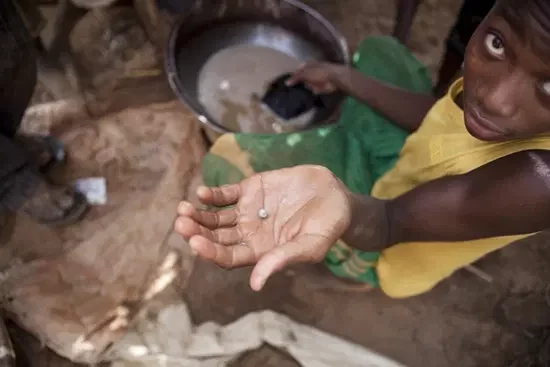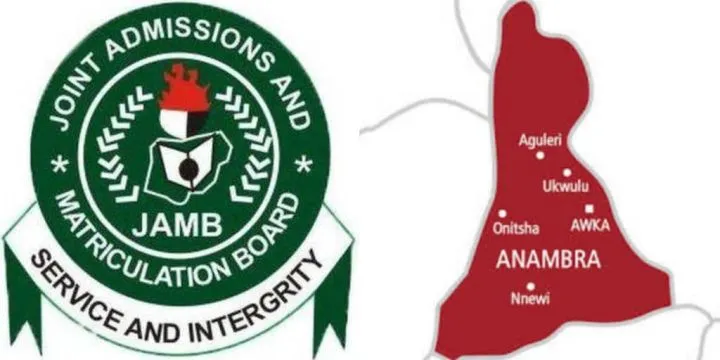
Ordinarily, the large deposits of lead in Enyigba community in Abakaliki Local Government Area and Ameka community in Ezza South Local Government Area of Ebonyi State should be a thing of joy, happiness and a source of wealth to the people.
But from every indication, it is not so because of the side effects of the mineral on the lives of the people.
The presence of the mineral is rather a mixture of blessing and misfortune due to the environmental hazards and degradation that come with it.
The people of Enyigba and Ameka communities, numbering thousands, have been afflicted by lead-related ailments, resulting from eating crops, vegetables, fruits, tubers, and grains; and drinking water contaminated by the mineral deposit.
We don't have any choice - Residents
In the midst of these health hazards, the residents of the communities said they don't have a choice but to eat their food and drink the water from their soil, which in most cases is contaminated.
Some of them have suffered strange ailments caused by contaminated foods.
A community leader, Chief Ewa Nworie said the lead deposit prevents crops from growing because of the toxic nature of the soil.
He said water from the rivers and streams around the mining areas is not good for drinking, having been polluted by lead.
"We are not finding it easy to live in this community. Lead pollution is affecting both our health and farm produce. Our water is polluted, we don't drink it; we resort to well water and borehole which dries up in dry season", Nworie lamented.
A resident of one of the communities, Mrs. Amauche Nwogha, decried their environment, saying that it is not the best for habitation due to health-related matters of lead. She said that their children suffer various skin infections and other ailments as a result of lead pollution.
"We suffer from lead pollution and poison through the water we drink and dusty environment. Some of us and our children are suffering from one ailment or the other. We don't have a good hospital to treat us, the one we have is far from us and when you visit the hospital, they refer you to the city to run some medical tests and further treatment.
"We are not only talking about our farms and crops. We are talking about our health first. The government should help us by providing good health facilities here and good pipe-borne water.
"Yes, our land is not fertile because of the lead. We don't have good yields from our farms. Some of us have farms far from the area, but some of us who don't have land in any other place, farm here and manage what we have. Our vegetables, tubers of yam, cassava, and other grains are being contaminated by lead", she complained.
We are neglected by miners
Another resident, Mr. Chike Nweke, complained that the villagers who suffer from lead-related problems, don't benefit from the royalty being paid by lead miners in the community.
He said that most of the natives, due to ignorance, don't know that lead causes harm to their health.
"We need serious enlightenment for our people living in the lead mining areas. While some people know that lead causes low yield, others don't know it is very dangerous to their health.
"We want the government to help us provide farmlands far from mining sites and also compel the lead mining companies to provide basic amenities as provided in the agreement signed with them. This is how it is done everywhere; ours should not be different", Nweke said.
Effect of lead on humans, crops, by varsity don
Noting the effects of lead mining, a lecturer in the Department of Industrial Chemistry, Ebonyi State University, Prof. Wilberforce Oti, stressed the need for the state government to engage in sensitizing the public, especially people of the affected communities, on the dangers of consuming contaminated farm produce and water from the mining areas.
He said that 90% of crops from the mining areas, including tubers, fruits, and vegetables, have been contaminated by lead.
Prof. Oti explained that the contamination is a result of mining activities in areas like Enyigba, where lead from the mining sites leaches into the soil and is absorbed by the crops.
"According to my research, in areas like Enyigba, about 20% of the people are already affected by lead-related issues because of the answers they gave to our questionnaires.
"Secondly, most of the plants that are coming from these polluted areas, 90% of them are already polluted, because the moment there is lead in the soil, the plants will absorb it", Prof. Oti explained.
He explained further that while some areas not affected by lead contamination are safer for farming, many crops from the polluted areas are sold outside the region, leading to the spread of contaminated produce.
Prof. Oti noted the serious health risks involved in consuming contaminated crops, particularly for pregnant women, as lead stored in the bones could be transferred to unborn children, potentially causing severe birth defects.
He, therefore, recommended the adoption of "phytoremediation", a process that uses specific plants to remove toxic metals from the soil, to restore the land for safe farming.
"The government should step in, those plants that are already affected by metal pollutants should be banned, and farmers should be encouraged to use land that is not polluted to plant their crops because, in time, a lot of people will be affected with diseases that are associated with lead and other toxic metals.
Also, they should be educated and enlightened to know that some of the plants they are eating now will eventually affect them," Oti noted.
The university don also emphasised the need for more research and funding to identify additional plants suitable for "phytoremediation" and to explore nanotechnology to improve efficiency of the process.
Also, a medical practitioner at Alex Ekwueme Federal University Teaching Hospital, Abakaliki, Dr. Charles Akuma, said the people of the communities had been exposed to heavy metals in the environment.
According to him, in areas with high lead and zinc contamination of food and water, metallic poisoning usually occurs.
H added that metals leached from eating utensils and cooking wares had contributed to these poisonings.
Dr. Akuma said that lead is a heavy metal that could be absorbed through the skin, respiratory, and digestive systems, which he said could accumulate in the body's organs, saliva, hair, nails, and teeth.
Stressing the adverse effects of lead, Akuma said: "Young children are particularly vulnerable to the toxic effects of lead and can suffer permanent adverse health impacts, particularly in the development of the central nervous system.
''Lead causes long-term harm in adults, including increased risk of high blood pressure, cardiovascular problems, and kidney damage.
"Lead mining can cause lead poisoning, which can lead to many diseases such as respiratory diseases, lead can cause chronic obstructive pulmonary disease (COPD), asthma, lung cancer, and nervous system disorders; lead can cause nerve damage, headaches, and memory and concentration problems.
"Lead can cause high blood pressure, stroke, peripheral arterial disease, and coronary heart disease. Lead can cause digestive disorders and abdominal pain. It can cause renal impairment and renal cancer. Lead can cause reproductive problems in both men and women. Lead can also cause anemia, seizures, coma, paralysis, and infertility".
A lecturer in the Department of Crop Science at Ebonyi State University, Dr. Nnaemeka Eze said that crops in lead mining areas don't grow healthy farm produce due to the acidic nature of the lead.
He explained that natural components of lead sulfide were the most stable solid form within the soil, adding that the earth's crust remains a major constituent of soil.
Eze noted that not all traces of heavy metals in plants and animals are the results of human activity, stressing that some arise through the absorption processes of naturally occurring soil components.
"In more recent times, humans are exposed to lead via the food chain by the consumption of plants grown in the lead environments or animals that graze on grasses around lead mining areas.
"The emergence of the industrial age and large-scale mining brought occupational diseases caused by various toxic metals. One of the main dietary sources of lead is from grains; whole grains contain high lead since fibrous seed coat retains minerals.
"Other dietary sources of lead are vegetables and meats. Lead enters the food chain from contaminated soil and lead dust which accumulates on the plants. The lead taken up by plant materials is eaten by animals which are indirect sources of lead uptake by humans.
"Lead from the atmosphere that settles on soil has low mobility and tends to stay in the top inch of the soil. Therefore shallow-rooted plants such as grasses and common vegetables are particularly vulnerable to lead contamination that originates in the atmosphere.
"In developing countries such as Nigeria, India, Pakistan, and China, the need to maximize food production is very essential. Therefore factors such as metal deficiency or toxicity that can prevent crops from attaining their growth should be restored and minimized", Eze explained.
Ebonyi govt flays FG for poor supervision of miners
The Ebonyi State commissioner for Solid Mineral Development, Chidi Onyia said the state government is doing a lot to ensure that the lead mining communities are comfortable and live healthier.
He said that the mining license is under the control of the federal Ministry of solid minerals and that the state had little to say or contribute, despite being the host.
Onyia explained that the mining companies under the agreement with the state and the host communities were supposed to provide basic amenities such as hospitals, schools, electricity, and water to the host communities. He regretted that they didn't fulfil the agreement.
He noted that the state government under the leadership of Governor Francis Nwifuru, has insisted that mining companies should adhere to the agreement of provision of amenities to the host communities before the commencement of their operations in the state.
On the alleged contamination of crops in the mining areas, Onyia did not dispute the claim but noted that Prof. Oti did not make public the result of his scientific research to support his findings before coming up with a 90 percent crop contamination figure.
"You know that mining development is under the federal ministry of solid minerals. They are the agency authorized by the federal government to issue licenses to the mining companies. So, the state government has no power to query or sanction the mining companies notwithstanding that the state is the host of the mine sites.
''The Ministry of Solid Mineral Development doesn't even regularly monitor the activities of the miners in the state to ensure that they meet up with the agreement signed with the host communities. They also don't conduct needs and impacts assessments in the areas where they issued licenses to a miner to do business.
"Mining causes environmental degradation across the world, not only in Nigeria or Ebonyi State.
Therefore, miners need to be checkmated to adhere to the guidelines, regulations, and agreement of providing basic amenities like hospitals, schools, pipe borne water, electricity, etc. These will help the host communities to live a healthy life.
"On our part as a host state, our governor insisted that any mining company coming into the state should first provide those amenities before starting operation. This is because in the past, when they started operation, they did not provide those amenities.
''So, we are making sure that any mining company operating in the state must provide the amenities as stipulated in the mining laws and agreement with the host communities.
"We are aware that in the state, the mining areas are far away from the communities and farm areas. The mining site at Enyigba is far from the community farms because we know that lead and zinc are not good for the crops, coupled with other health-related issues of the mining.
"The lecturer may be right that mining contaminates crops, but to narrow it down to Enyigba and to say it is 90 per cent affecting the crops in the area is what I cannot agree with.
'This is because the farmland is far from the mining areas. I agree that there may be other health-related mining issues which are general across Nigeria and the world as a whole", Onyia stated.


















Comments